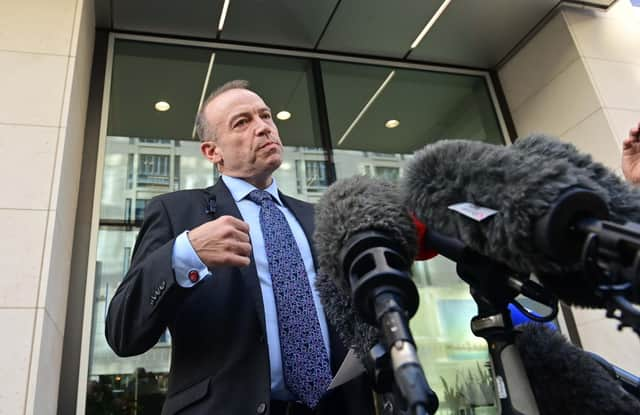Owen Polley: Government’s Northern Ireland policy looks chaotic and contradictory


Since February, of course, our power-sharing executive has failed to operate, due to the DUP’s decision to boycott the devolved institutions over the NI Protocol. The party’s leader, Sir Jeffrey Donaldson, argues that the Irish Sea border has subverted the Belfast Agreement by separating the province economically and politically from the rest of the UK, and devolution cannot continue as normal.
At times, when it is challenging the protocol, the government seems largely to share this analysis. Indeed, the NI minister, Steve Baker, acknowledged recently that it was in unionists’ “legitimate interests” to remove the jurisdiction of European courts here, and implied that a devolved executive would not exist until that happened.
Advertisement
Hide AdAdvertisement
Hide AdYet, the government and its ministers have also attempted repeatedly to pressure the DUP back into the institutions at Stormont, irrespective of whether progress was made on dismantling the Irish sea border or not.
Now, even in that regard, their tactics look inconsistent.
The secretary of state is obliged by law to call a fresh election in Northern Ireland if the parties cannot form a power-sharing executive within six months of a Stormont poll. In the run up to October 28, which was nominally the deadline for that decision, Mr Heaton-Harris insisted that he would announce a date for a ballot immediately.
After the media waited in vain for this to happen, he presided over a period of uncertainty and confusion, claiming that an election would still definitely be called, but declining to say when. Then, last week, the secretary of state announced that he would legislate to delay the poll, perhaps for six weeks, probably for twelve, and, who can say, potentially indefinitely after that.
Some commentators explained this about turn by claiming that the PM, Rishi Sunak, was less enthusiastic than Mr Heaton-Harris about the prospect of another election. Whether or not that is accurate, the appearance of indecision damages the secretary of state’s authority and undermines his credibility with the public.
Advertisement
Hide AdAdvertisement
Hide AdMr Heaton-Harris explained his flip-flop by claiming that he simply listened to the people of NI, its politicians and, somewhat bizarrely, its business representatives. The idea that our electoral cycle needs the say-so of business groups is certainly a new one.
Setting that blather aside, it’s fair for Mr Heaton-Harris to argue that an election would not have broken the political deadlock in Northern Ireland. The DUP would have sought, and almost certainly gained, an enhanced mandate for refusing to revive the executive.
With that in mind, though, why was the secretary of state so adamant that he would call a poll as soon as the deadline was reached? Did he really think that the DUP would respond to his threats and nominate ministers, despite its repeated denials that this was an option? Or did something else change?
The government has encouraged the idea that a deal with the EU is possible in the coming weeks. Mr Heaton-Harris told the Commons that he still hoped to resolve the protocol row through a “negotiated settlement”, while Rishi Sunak expressed confidence that there would be a breakthrough, after a meeting with Micheál Martin last week.
Advertisement
Hide AdAdvertisement
Hide AdIt is possible that, in private, the EU’s attitude to dismantling the Irish Sea border is more positive than its public statements. However, there are few signs that the likes of Maros Sefcovic, its chief negotiator, acknowledge that the protocol creates constitutional as well as practical difficulties.
He continues to talk only about reducing checks, which are just a symptom of effectively dragging Northern Ireland out of the UK’s internal market. That would not address the extra costs and paperwork currently dissuading companies in Great Britain from shipping to Northern Ireland, never mind restore elements of British sovereignty that have been stripped away.
It seems more likely that the government is not particularly close to a comprehensive deal with the EU.
It may still hope that it can persuade Brussels to resolve the additional issues if the two sides build up momentum first by coming to an agreement on checks. Or perhaps it is set to strike a deal that offers only minor changes to the protocol.
Advertisement
Hide AdAdvertisement
Hide AdThe government knows that a section of the media and most of the political class would greet any agreement as a significant breakthrough. They would form an opinion almost immediately, based on whatever the EU tells them, and no amount of inconvenient detail would shake it. That would give ministers a perfect platform from which to berate the DUP into going back to Stormont. And if this were not successful, they could resort to threats to reform the institutions in a way that sidelined the party, or imply that Dublin would become deeply involved in decisions on devolved matters.
The Conservative government likes to trumpet its unmoveable support for the Union between Great Britain and Northern Ireland, so you would hope that it does not go down that route. We can all be confident, though, that, however the PM intends to proceed, there will be more crises and more political drama coming to Northern Ireland in the new year.